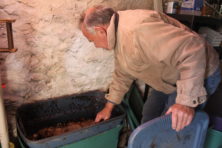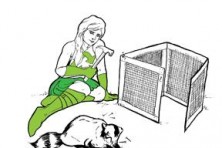Composting – the Ultimate Recycling
- Share
- Tweet
- Pin
- Share
Food waste makes up fully 10 percent of all waste in landfills today, and it’s estimated no less than 25 percent of all food produced in the United States ends up in the trash. Such waste occurs despite the fact that composting is one of the simplest forms of recycling available.
Marcy McGrath from the Wisconsin Department of Natural Resources gave a presentation about the methods and benefits of composting April 9 as part of the Going Garbage Environmental Speaker Series.
Among the benefits derived from composting, McGrath said it returns nutrients to the soil, improves the soil’s water holding capacity, improves drainage, and saves landfill space.
She said her office began a food-composting program after the DNR’s new Green Bay headquarters opened in 2005. The LEED-certified project was immediately hailed as a model of sustainable building, and McGrath and her colleagues felt it would be ridiculous to work in such a great new building and not do more, so they began a composting program.
“To date, almost 4,000 pounds of food has been composted,” she said.
Employees put collection buckets on each floor near the coffee machines and collect them daily to put in compost bins outside.
McGrath explained that composting can be as simple or difficult as you choose to make it. Some choose to just start a pile, while the more involved get into nutrient management and special bins and tumblers. Whatever your style, there are a few simple guidelines to know.
Among the items that can be composted are coffee grounds and filters, tea bags, eggshells, nuts and their shells, paper towels and napkins, yard debris, and even pizza boxes (tear them up a little or shred them first).
Dairy products, diseased or insect-ridden plants, bones, meats, fats and oils are all items you should keep out of your compost.
A well-managed compost bucket or pile can produce a finished product in four to eight weeks to be used as mulch in the garden, a soil amendment, lawn top dressing, or as potting mix.
To find more information on home composting visit composting101.com.
The next speaker in the Going Garbage series is Wess Damro of Brown County Hazardous Waste. He’ll give a presentation titled “To Be, or Not To Be Hazardous Waste,” May 15. A 20-minute film, The Digital Dump, will be shown prior to the presentation at 6:30 pm.
Going Garbage sponsored the five-speaker series this winter to help educate the public, said Co-owner Christi Decker.
“We wanted to bring people to answer questions we don’t always have the answers for,” she said. “It’s an educational and advocacy program, and so many people have brought excellent questions to the sessions.”


